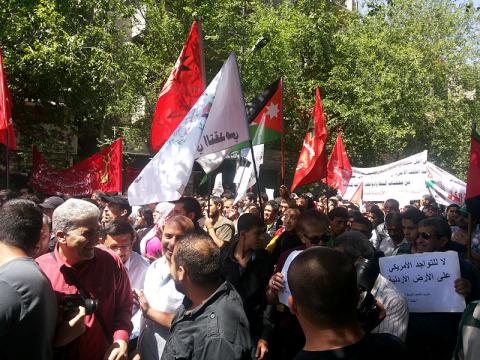
On November 9, 2017, following its review of the current human rights situation in Jordan, the UN Human Rights Committee (HR Committee) published its concluding observations, raising concerns over the human rights violations committed under the pretext of counter-terrorism, the issue of torture and the treatment of refugees, among other issues.
The HR Committee is charged with examining the implementation of the International Covenant on Civil and Political Right (ICCPR), which Jordan ratified in 1975. The concluding observations were adopted after the UN experts considered Jordan’s national report, and subsequently engaged in a dialogue with the state party on October 19 and 20, 2017.
Counter terrorism measures
The HR Committee made numerous recommendations which echoed those made by Alkarama in its shadow report, submitted to the UN experts ahead of the review. One such recommendation relates to human rights while countering terrorism.
In its concluding observations, the UN experts expressed concern over the provisions contained in the Anti-Terrorism Law of 2006, including its 2014 amendments which broadened the definition of terrorism as well as the scope of the jurisdiction of the State Security Court (SSC).
The 2014 amendments granted the SSC authority over non-violent offences by defining terrorist acts as those which disturb “the public order” or “relations with a foreign state”. This can be illustrated by the case of Amjad Qourshah, a 48-year-old assistant professor, who was arrested for having posted a video online in which he criticised the participation of Jordan in the international coalition led by the USA against the Islamic State (IS).
During the session, the HR Committee experts declared that such provisions could be used to stifle dissent, and recommended that Jordan ensure that terrorist acts are defined in accordance with international standards.
Regarding the State Security Court, the experts reiterated recommendations already expressed in 1994 and 2010 that Jordan abolish this special court. The HR Committee found that the SSC lacked fair trial guarantees given its lack of independence from the executive and its close relationship with the General Intelligence Directorate (GID).
Torture and ill-treatment
On the issue of torture and ill-treatment by security forces, the HR Committee drew attention to the shortcomings of Jordan’s legal framework. Torture is only considered a misdemeanour under the current Penal Code unless it results in serious injuries, meaning that punishment is not commensurate with the gravity of the acts.
The concluding observations also recalled that the State Security Law allows the general director of the Public Security Directorate (PSD) to consider cases of torture as misdemeanours carrying a prison sentence of less than three years.
The HR Committee urged Jordan to “establish an effective and independent mechanism to receive complaints and investigate alleged cases of torture”. Cases of torture involving members of the PSD and the GID continue to be handled by special courts, namely the Police Court and GID military courts, whose proceedings are neither independent nor transparent. To this date, no sentences have been handed down for acts of torture.
Regarding the issue of refugees in Jordan, the HR Committee explained that it was aware that Jordan was hosting thousands of Syrian refugees fleeing war and persecution. Nevertheless, the experts expressed concern over reported cases of the forcible return of refugees to Syria, including Palestinian refugees, contrary to the principle of non-refoulement enshrined in article 3 of the Convention against Torture (UNCAT). According to NGO reports, the Jordanian authorities were deporting approximately 400 registered Syrian refugees per month as of early 2017.
Restrictions on freedom of expression, association and assembly
Echoing Alkarama’s concerns, the HR Committee condemned the fact that journalists continue to face prosecution and sanctions under the Penal Code and Anti-Terrorism Law if they are to express views considered to be critical, for example “insulting the King”.
The HR Committee expressed further concern over the erosion of the right to freedom of association in Jordan. On March 17, 2016, the Social Development Ministry proposed amendments to the already restrictive 2009 Law on Societies. These amendments place restrictions on the formation of civil society groups, grant the government legal authority to dissolve groups on vague grounds, and deny civil society groups their ability to obtain foreign funding without justification.
Finally, despite the important advances made in the Public Gathering Law of 2011, which was adopted in the wake of the Arab spring to safeguard the right to peaceful assembly in the country, the experts observed that this law is often circumvented in practice. Many demonstrations were prohibited and participants and organisers were detained under both the Prevention of Crimes Law and the Anti-Terrorism Law.
What is next?
Although the HR Committee welcomed the adoption of Jordan’s National Human Rights Action Plan – a 10-year initiative that calls for numerous changes to legislation, policy, and practice – it noted that many challenges remain.
The UN experts requested that Jordan provide, within two years, information on the implementation of their most pressing recommendations, which focussed on women’s rights, the right to life and liberty of persons, the humane treatment of persons deprived of liberty, as well as the issue of refugees and non-refoulement. This information will also provide an opportunity to measure the first results of the National Human Rights Action Plan for 2016-2015.
For more information or an interview, please contact media@alkarama.org (Dir: +41 22 734 1008).
